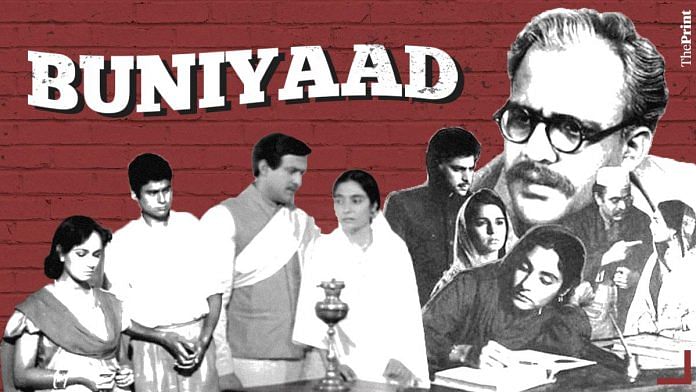That Partition took countless lives on both sides of the border and is a reminder of a painful, bloody chapter in India and Pakistan’s history is a fact, but it has also given rise to some powerful works of art in the literary, visual and performance spaces.
Saadat Hasan Manto’s Toba Tek Singh, Khol Do and Kali Shalwar, Ismat Chugtai’s Jadein and Urvashi Butalia’s The Other Side of Silence are a few examples in literature, while films like Garm Hava and Dharamputra told Partition stories on the big screen. But it was Ramesh Sippy’s 1980s Doordarshan show Buniyaad that brought that chapter of history to television.
First aired in 1986, the show is based on the premise of the classic Indian family. Revolving around how Master Haveliram (Alok Nath, who believed this role typecast him as an old man) met and fell in love with Lajoji (Anita Kanwar), their family and subsequent separation followed by a heartwarming reunion, Buniyaad was a chilling reality for many who watched the show as well as for the many who made it across the border.
Also read: Bharat Ek Khoj: Shyam Benegal’s adaption of Nehru’s Discovery of India was a Sunday staple
A painful catharsis for the cast
For Joneja, who played Haveliram’s sister Veeravali, the show was also a painful experience as she realised that she was reliving the story of her grandparents. “My maternal grandfather was a zamindar, but used to teach as a hobby. He was called Masterji. He stayed back in Pakistan after the Partition for a year and saved the lives of many girls. My grandfather was called Lalaji and my aunt, Veeravali, as she had three brothers. So, in a way, I was reliving the memories of my parents and grandparents, the horror stories of the Partition that they used to tell us. It was cathartic,” said Joneja. “It still hurts.”
It was equally cathartic for many who watched it. Rohini Ahluwalia, who lives in Delhi with her daughter and grandchildren, recalls that her parents initially didn’t want to watch the show, because they couldn’t bear to relive the memories of Partition and pick at wounds that had not healed. But they also, somewhere, wanted their children to know about Partition. “They didn’t watch the first few episodes, but slowly, they got into it and it opened up some small conversations around it at home,” she tells ThePrint. “And that was the case for a lot of people in Delhi, I think.”
The show’s popularity translated into numbers as well with “over 93 per cent viewership in North India for all the years.” It has been rerun six times since it was first aired in 1986, but director Ramesh Sippy was not paid for it. Owing to “confusions over details of the transaction”, the payment was stuck and while a fresh arbitration had begun, it did not end with a solution, as of 2016.
Also read: Trishna, the popular 1985 Doordarshan adaptation of Pride & Prejudice, is now on YouTube
Best actors and relatable writing made show a hit
A hit in both India and Pakistan, the 104-episode saga was so masterfully written by Manohar Shyam Joshi that more than three decades later, it is still as gripping.
Ramesh Sippy and Jyoti Sarup’s direction and Amit Khanna’s production brought to life pre-Partition days, with careful attention to the period architecture and interiors, clothes and language. With an ensemble cast consisting of today’s finest actors including Anita Kanwar, Kanwaljeet Singh, Mazhar Khan, Dalip Tahil, Soni Razdan, Kiran Joneja (who later married Ramesh Sippy) and Neena Gupta among many others, the show hit the nail on the head owing to the cocktail of talent on and off screen (famed novelist Krishna Sobti and scholar Pushpesh Pant helped out with ensuring historical accuracy).
It took three or four days to shoot and dub one episode, so the cast and crew were required to give a year of their lives to the show.
Soni Razdan, who played the role of Lochan (Haveliram’s elder daughter-in-law), spoke about how their whole life revolved around Film City while shooting the show as they spent countless hours on set. She was pregnant at the time, and recalls how she was treated with utmost care and respect.
“They had turned my room into something special. I was not well at the beginning of my pregnancy. They would call on me only when I was needed. The production house also sent a car to pick me up everyday,” she said.
As the show came back on Doordarshan during India’s nationwide lockdown, Razdan spoke of how “it means even more in the light of communal sentiment that is thrown around today,” hinting at the riots that took place in Delhi’s northeast district in February.
Also read: Nukkad, Saeed Mirza’s DD classic that used humour and a gentle gaze to portray the poor



